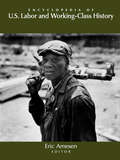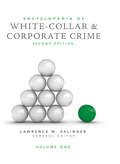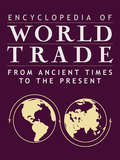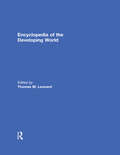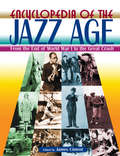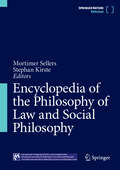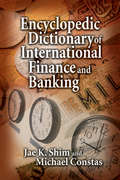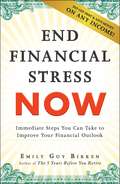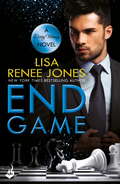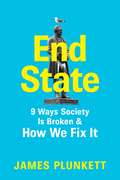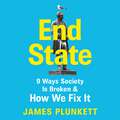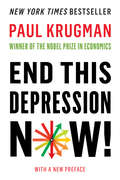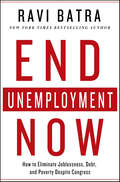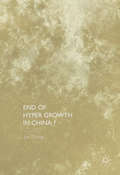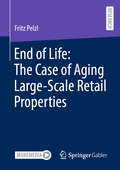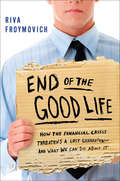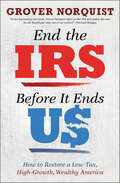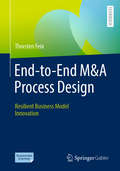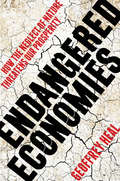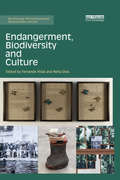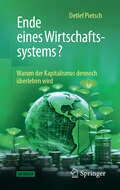- Table View
- List View
Encyclopedia of U.S. Labor and Working-Class History
by Eric ArnesenA RUSA 2007 Outstanding Reference Title The Encyclopedia of US Labor and Working-Class History provides sweeping coverage of US labor history. Containing over 650 entries, the Encyclopedia encompasses labor history from the colonial era to the present. Articles focus on states, regions, periods, economic sectors and occupations, race-relations, ethnicity, and religion, concepts and developments in labor economics, environmentalism, globalization, legal history, trade unions, strikes, organizations, individuals, management relations, and government agencies and commissions. Articles cover such issues as immigration and migratory labor, women and labor, labor in every war effort, slavery and the slave-trade, union-resistance by corporations such as Wal-Mart, and the history of cronyism and corruption, and the mafia within elements of labor history. Labor history is also considered in its representation in film, music, literature, and education. Important articles cover the perception of working-class culture, such as the surge in sympathy for the working class following September 11, 2001. Written as an objective social history, the Encyclopedia encapsulates the rise and decline, and continuous change of US labor history into the twenty-first century.
Encyclopedia of White-Collar and Corporate Crime
by Lawrence M. SalingerSince the first edition of the Encyclopedia of White Collar and Corporate Crime was produced in 2004, the number and severity of these crimes have risen to the level of calamity, so much so that many experts attribute the near-Depression of 2008 to white-collar malfeasance, namely crimes of greed and excess by bankers and financial institutions. Whether the perpetrators were prosecuted or not, white-collar and corporate crime came near to collapsing the U.S. economy. In the 7 years since the first edition was produced we have also seen the largest Ponzi scheme in history (Maddoff), an ecological disaster caused by British Petroleum and its subcontractors (Gulf Oil Spill), and U.S. Defense Department contractors operating like vigilantes in Iraq (Blackwater). White-collar criminals have been busy, and the Second Edition of this encyclopedia captures what has been going on in the news and behind the scenes with new articles and updates to past articles.
Encyclopedia of World Trade: From Ancient Times to the Present
by Jerry H. Bentley Cynthia Clark Northrup Kenneth Pomeranz Patrick Manning Steven Topik Alfred E. Eckes, JrWritten for high school or beginning undergraduate students, this four-volume reference valiantly attempts to provide a historical framework for the perhaps overly broad concept of world trade. Entry topics were selected on trade organizations, influential people, commodities, events that affected trade, trade routes, navigation, religion, communic
Encyclopedia of the Developing World
by Thomas M. LeonardA RUSA 2007 Outstanding Reference Title The Encyclopedia of the Developing World is a comprehensive work on the historical and current status of developing countries. Containing more than 750 entries, the Encyclopedia encompasses primarily the years since 1945 and defines development broadly, addressing not only economics but also civil society and social progress. Entries cover the most important theories and measurements of development; relate historical events, movements, and concepts to development both internationally and regionally where applicable; examine the contributions of the most important persons and organizations; and detail the progress made within geographic regions and by individual countries.
Encyclopedia of the Jazz Age: From the End of World War I to the Great Crash
by James CimentThis illustrated encyclopedia offers in-depth coverage of one of the most fascinating and widely studied periods in American history. Extending from the end of World War I in 1918 to the great Wall Street crash in 1929, the Jazz age was a time of frenetic energy and unprecedented historical developments, ranging from the League of Nations, woman suffrage, Prohibition, the Red Scare, the Ku Klux Klan, the Lindberg flight, and the Scopes trial, to the rise of organized crime, motion pictures, and celebrity culture."Encyclopedia of the Jazz Age" provides information on the politics, economics, society, and culture of the era in rich detail. The entries cover themes, personalities, institutions, ideas, events, trends, and more; and special features such as sidebars and photos help bring the era vividly to life.
Encyclopedia of the Philosophy of Law and Social Philosophy: Volume 3: From Ross To Dworkin And Beyond (Studies In The History Of Law And Justice Ser. #24)
by Mortimer Sellers Stephan KirsteThis encyclopedia covers all topics in the philosophy of law and social philosophy, including the history, theory, and leading theorists in both fields. Featuring specially commissioned entries by an international team of the world's most respected scholars, including more than 700 entries ensuring its place as the definitive reference work on the Philosophy of Law and Social Philosophy.The encyclopedia provides: 1) a clear concise expert definition and explanation of the key concepts in the field, written by leading scholars; 2) an essential reference for experts and newcomers alike, with entries ranging from short definitions of key terms to extended explorations of major topics; 3) an investigation of questions that have traditionally defined the field, but also more recent developments, significantly updating the fields of the philosophy of law and social philosophy; 4) introductions to theories and research developed in all the world's languages and legal traditions.
Encyclopedic Dictionary of International Finance and Banking
by Jae K. Shim Michael ConstasThe Encyclopedic Dictionary of International Finance and Banking is a practical reference of proven techniques, strategies, and approaches. It covers virtually all important topics dealing with multinational business finance, money, investments, financial planning, financial economics, and banking. In addition, it explores the application of comput
End Financial Stress Now: Immediate Steps You Can Take to Improve Your Financial Outlook
by Emily Guy BirkenEnd financial stress for good and learn how to manage your money—without a change to income!Studies have shown time and time again that money is a leading cause of stress—but a life free from financial worry isn’t exclusive to the rich and powerful. End Financial Stress Now gives you practical, actionable instructions you need to improve your money management—no matter what your income level is. You can learn how to achieve the mindset of financial flexibility, which can help you navigate any money issues you face. These practical, step-by-step instructions on budgeting can help you track expenses, pay off debt, and save money. Featuring straightforward advice on how to increase self-discipline so you can stick to your budget as well as techniques to help you identity misinformation and false beliefs you have about money, you can follow this guide to create a fulfilling life free of financial stress.
End Game: Dirty Money 4 (Dirty Money)
by Lisa Renee JonesWall Street meets Sons of Anarchy in End Game, the smouldering, scorching fourth novel in the explosively sexy Dirty Money series from New York Times bestseller Lisa Renee Jones, author of the Inside Out series.How deep can you love?After tragedy strikes, Shane Brandon hovers on the edge of being consumed by darkness. He will fight for Emily Stevens, the woman he loves. He will destroy his enemy. He will not back down. And as shocking twists, dark secrets, and explosive betrayals within the Brandon family come to the light, Shane must fight harder than ever before.Every thread weaves a dangerous web. Emily and Derek. Brandon Senior. Maggie and her affair. The leader of the dangerous cartel that's wedged itself inside the Brandon Empire. It all comes to a head when passion and danger collide in the explosive conclusion to the Dirty Money series.Are you ready to play by the hard rules of the Brandon family empire? Check out the other compelling novels in the Dirty Money series: Hard Rules, Damage Control and Bad Deeds.
End State: 9 Ways Society is Broken – and how we can fix it
by James Plunkett'His analysis of what needs to be re-thought and repaired is beautifully written, clear and ultimately optimistic. This book made me think. For me, there is no higher praise' Gavin Esler, author of How Britain Ends"A book full of bold ideas for how to make life better. James Plunkett is a one man think tank and his ideas deserve a wide audience" Andrew Adonis, author of Saving BritainCan we reverse the mental health crisis by getting rid of Mondays? Is it time to stop poor people being poor by... giving them money? Can we quell the fires of populism by giving young people a say in the future?As the shockwaves of Covid 19 continue to spread, and as the smoke clears from a year of anger and unrest, many people feel forlorn about the future.In End State, James Plunkett argues that this can be a moment not of despair, but of historic opportunity - a chance to rethink, renew, and reform some of the most fundamental ways we organise society. In much the same way as societies emerged stronger from crises in the past - building the state as we know it today - we too can build a happier future.James Plunkett has spent his career thinking laterally about the complicated relationships between individuals and the state. First as an advisor to Gordon Brown, then a leading economic researcher and writer, and then in the charity sector, helping people struggling at the front-line of economic change. James combines a deep understanding of social issues with an appreciation of how change is playing out not in the ivory tower, but in the reality of people's lives.Now, in his first book, he sets out an optimistic vision, exploring nine ways in which our social settlement can be upgraded to harness the power of the digital age. Covering a dizzying sweep of geography and history, from London's 18th Century sewage systems to the uneasy inequality of Silicon Valley, it's a thrilling and iconoclastic account of how society can not only survive, but thrive, in the digital age. End State provides a much-needed map to help us navigate our way over the curious terrain of the twenty-first century.
End State: 9 Ways Society is Broken – and how we can fix it
by James Plunkett'His analysis of what needs to be re-thought and repaired is beautifully written, clear and ultimately optimistic. This book made me think. For me, there is no higher praise' Gavin Esler, author of How Britain EndsCan we reverse the mental health crisis by getting rid of Mondays? Is it time to stop poor people being poor by... giving them money? Can we quell the fires of populism by giving young people a say in the future?As the shockwaves of Covid 19 continue to spread, and as the smoke clears from a year of anger and unrest, many people feel forlorn about the future. In End State, James Plunkett argues that this can be a moment not of despair, but of historic opportunity - a chance to rethink, renew, and reform some of the most fundamental ways we organise society. In much the same way as societies emerged stronger from crises in the past - building the state as we know it today - we too can build a happier future.James Plunkett has spent his career thinking laterally about the complicated relationships between individuals and the state. First as an advisor to Gordon Brown, then a leading economic researcher and writer, and then in the charity sector, helping people struggling at the front-line of economic change. James combines a deep understanding of social issues with an appreciation of how change is playing out not in the ivory tower, but in the reality of people's lives.Now, in his first book, he sets out an optimistic vision, exploring nine ways in which our social settlement can be upgraded to harness the power of the digital age. Covering a dizzying sweep of geography and history, from London's 18th Century sewage systems to the uneasy inequality of Silicon Valley, it's a thrilling and iconoclastic account of how society can not only survive, but thrive, in the digital age. End State provides a much-needed map to help us navigate our way over the curious terrain of the twenty-first century.Narrated by Olly Mann (Answer Me This!, The Week Unwrapped, The Modern Mann)
End This Depression Now!
by Paul Krugman<P> A New York Times best-selling call to arms from Nobel Prize–winning economist Paul Krugman. <P> The Great Recession is more than four years old—and counting. Yet, as Paul Krugman points out in this powerful volley, "Nations rich in resources, talent, and knowledge—all the ingredients for prosperity and a decent standard of living for all—remain in a state of intense pain." <P> How bad have things gotten? How did we get stuck in what now can only be called a depression? And above all, how do we free ourselves? Krugman pursues these questions with his characteristic lucidity and insight. He has a powerful message for anyone who has suffered over these past four years—a quick, strong recovery is just one step away, if our leaders can find the "intellectual clarity and political will" to end this depression now.
End Unemployment Now: How to Eliminate Joblessness, Debt, and Poverty Despite Congress
by Ravi BatraThe year 2010 marked when the National Bureau of Economic Research declared an end to the Great Recession. The economy had shed over six million jobs in 2008 and 2009, but few had been recalled to work by 2010. Today, government policies have yet to make a significant dent in unemployment. In End Unemployment Now, Ravi Batra explores why this is the case. He explains how joblessness can be completely eliminated—in just two years, and without the help of our painfully incompetent Congress. The President and the Federal Reserve have the legal authority to generate free-market conditions that will quickly end the specter of unemployment, all without involving Congress.Some examples of how to end unemployment without congressional intrusion:• Creating a bank by the FDIC to compete with banking giants and then charging only 5% interest rates on credit card balances, instead of the standard 10-35% seen today• Banning mergers among large and profitable firms, as such mergers directly cause layoffs and reinforce monopoly capitalism• Aid to small businesses in the form of cheap loans and government contracts, because small firms have been real job creators since 1980, while Big Business has been a job destroyer• Offer retiree bonds to increase the incomes of pensioners who live on savings and whose incomes have been practically destroyed by the collapse of interest rates• Bring oil prices down to $20/barrel, which would lower a gallon of gas to $1.50
End of Hyper Growth in China?
by Jun ZhangIn this book, Dr. Jun Zhang rebuts the widely-held view that Chinese economic growth is unsustainable due to low consumption and a reliance on exports and enormous fixed-asset investments. Though many believe this "structural imbalance" of the Chinese economy will become a serious problem in the long run, Zhang holds a bullish long-term outlook owing to China's long-term economic development. For Zhang, China's structural problems are greatly exaggerated and certain structures, such as regional governing entities, ensure that China will not face the same economic issues that Japan encountered. Through regional competition, regional governments will persevere; Zhang predicts that China will overtake the US as a superpower. Zhang concludes by acknowledging the real dangers facing China's economy, and offering advice on the reforms needed to ensure continued growth.
End of Life: The Case of Aging Large-Scale Retail Properties
by Fritz PelzlRetail is an increasingly dynamic environment, shaped by digitalization, empowered customers and broad socio-economic changes. These factors are impacting retailers' business models and, in particular, their offline stores, which are subject to physical deterioration and obsolescence. Over time, the declining utility of built substance conflicts with increasing user expectations, ultimately leading to demolition. This includes significant urban, economic and environmental consequences. By analyzing an extended dataset based on the German demolition statistic, this study empirically examines the lifetime of demolished large-scale retail buildings. It identifies the characteristics of underperforming buildings as well as the triggers that ultimately lead to their demise. As demolition generates significant negative externalities, it is assessed whether end of life occurs prematurely. This is measured by technical and economic benchmarks, as well as against alternative assets. The study is conducted with the aim of future-proofing large retail properties, which is essential for sustainable future urban development.
End of Management?
by Gary Hamel Bill BreenGiven how little the practice of management has changed over the past several decades, it's hardly surprising that most people have a hard time imagining how management might be reinvented. In this chapter, the author considers the evolution of modern management and the challenges managers face in the 21st century, calling for a radical reinvention of management in the years to come. This chapter was originally published as chapter 1 of "The Future of Management."
End of The Good Life
by Riva FroymovichA richly reported examination of the effects of the financial crisis on Generation Y, and a portrait of a generation--and a nation--in crisis.
End the IRS Before It Ends Us: How to Restore a Low Tax, High Growth, Wealthy America
by Grover NorquistAs the recent scandal shows, the IRS is big, bad, and out of control. Grover Norquist analyzes the problems within the agency and presents solutions to rein them in.The driving force behind the American Revolution was our forefathers' refusal to accept unfair taxation. Citizens rose up, won a war against impossible odds, and established the most unique government on the face of the earth, with taxes set at about 2 percent.How much has changed since 1776?The strength of Americans resolve is still unrivaled, and Grover Norquist, founder and president of Americans for Tax Reform, knows that once liberty-loving Americans learn the truth behind the oppressive and prosperity-stifling taxes we face today, they'll rise up again.Urging his fellow citizens to join him, Norquist tells a powerful and urgent story that will convince you we must act now to End This Before It Ends Us.
End-to-End M&A Process Design: Resilient Business Model Innovation
by Thorsten FeixThe textbook provides a holistic M&A reference model for capturing value and transaction rational in dynamic eco-systems in the 2020s. The digitalized End-to-End M&A Process Design applies five process modules. It fosters the full-scope of digital tools and describes how it could be applied for shaping business model innovations and revitalize corporate portfolios and vice versa.This textbook has been recommended and developed for university courses in Germany, Austria and Switzerland.
End-to-End M&A-Prozessdesign: Resiliente Geschäftsmodell-Innovation
by Thorsten FeixDas Lehrbuch bietet ein ganzheitliches M&A-Referenzmodell für die Erfassung von Wert und Transaktionsrationalität in dynamischen Ökosystemen in den 2020er Jahren. Das digitalisierte End-to-End-M&A-Prozessdesign verwendet fünf Prozessmodule. Es fördert den vollen Umfang digitaler Werkzeuge und beschreibt, wie diese für die Gestaltung von Geschäftsmodellinnovationen und die Revitalisierung von Unternehmensportfolios eingesetzt werden können und umgekehrt. Dieses Lehrbuch wurde für Universitätskurse in Deutschland, Österreich und der Schweiz empfohlen und entwickelt.
Endangered Economies: How the Neglect of Nature Threatens Our Prosperity
by Geoffrey HealIn the decades since Geoffrey Heal began his field-defining work in environmental economics, one central question has animated his research: "Can we save our environment and grow our economy?" This issue has become only more urgent in recent years with the threat of climate change, the accelerating loss of ecosystems, and the rapid industrialization of the developing world. Reflecting on a lifetime of experience not only as a leading voice in the field, but as a green entrepreneur, activist, and advisor to governments and global organizations, Heal clearly and passionately demonstrates that the only way to achieve long-term economic growth is to protect our environment.Writing both to those conversant in economics and to those encountering these ideas for the first time, Heal begins with familiar concepts, like the tragedy of the commons and unregulated pollution, to demonstrate the underlying tensions that have compromised our planet, damaging and in many cases devastating our natural world. Such destruction has dire consequences not only for us and the environment but also for businesses, which often vastly underestimate their reliance on unpriced natural benefits like pollination, the water cycle, marine and forest ecosystems, and more. After painting a stark and unsettling picture of our current quandary, Heal outlines simple solutions that have already proven effective in conserving nature and boosting economic growth. In order to ensure a prosperous future for humanity, we must understand how environment and economy interact and how they can work in harmony-lest we permanently harm both.
Endangered Economies: How the Neglect of Nature Threatens Our Prosperity
by Geoffrey HealIn the decades since Geoffrey Heal began his field-defining work in environmental economics, one central question has animated his research: "Can we save our environment and grow our economy?" This issue has become only more urgent in recent years with the threat of climate change, the accelerating loss of ecosystems, and the rapid industrialization of the developing world. Reflecting on a lifetime of experience not only as a leading voice in the field, but as a green entrepreneur, activist, and advisor to governments and global organizations, Heal clearly and passionately demonstrates that the only way to achieve long-term economic growth is to protect our environment. Writing both to those conversant in economics and to those encountering these ideas for the first time, Heal begins with familiar concepts, like the tragedy of the commons and unregulated pollution, to demonstrate the underlying tensions that have compromised our planet, damaging and in many cases devastating our natural world. Such destruction has dire consequences not only for us and the environment but also for businesses, which often vastly underestimate their reliance on unpriced natural benefits like pollination, the water cycle, marine and forest ecosystems, and more. After painting a stark and unsettling picture of our current quandary, Heal outlines simple solutions that have already proven effective in conserving nature and boosting economic growth. In order to ensure a prosperous future for humanity, we must understand how environment and economy interact and how they can work in harmony—lest we permanently harm both.
Endangerment, Biodiversity and Culture (Routledge Environmental Humanities)
by Fernando Vidal and Nélia DiasThe notion of Endangerment stands at the heart of a network of concepts, values and practices dealing with objects and beings considered threatened by extinction, and with the procedures aimed at preserving them. Usually animated by a sense of urgency and citizenship, identifying endangered entities involves evaluating an impending threat and opens the way for preservation strategies. Endangerment, Biodiversity and Culture looks at some of the fundamental ways in which this process involves science, but also more than science: not only data and knowledge and institutions, but also affects and values. Focusing on an "endangerment sensibility," it encapsulates tensions between the normative and the utilitarian, the natural and the cultural. The chapters situate that specifically modern sensibility in historical perspective, and examine central aspects of its recent and present forms. This timely volume offers the most cutting-edge insights into the Environmental Humanities for researchers working in Environmental Studies, History, Anthropology, Sociology and Science and Technology Studies.
Ende der Machtposition!? Wie Mitarbeiterführung wirklich gelingt: Praxis-Know-how für erfolgreiche Führungskräfte und Manager
by Silke M. JürgensenWas brauchen Menschen im Unternehmen, um Erfolg zu erzielen?Egal, ob im kleinen oder mittelständischen Unternehmen oder in Konzernstrukturen, egal, in welcher Branche und auf welcher Hierarchieebene: Wenn Menschen zusammenarbeiten, um Ziele zu erreichen, haben sie es immer wieder mit ähnlichen Herausforderungen zu tun. Unabhängig davon, ob sie präsent oder im virtuellen Team arbeiten: Die Produktivität lässt zu wünschen übrig, Informationen fließen nicht ausreichend, im Veränderungsprozess ziehen nicht alle mit, das Leitungsteam kommt nicht zu vernünftigen Entscheidungen, die Fluktuation ist hoch, die Leistung eines Mitarbeiters lässt nach, die eigene Führungskraft delegiert nicht, es fehlt an Motivation, Vereinbarungen werden nicht konsequent umgesetzt, es gibt diverse Konflikte im Unternehmen, … Die Autorin gibt einen praxisorientierten und fundierten Überblick, wie Sie als Führungskraft mit konkret umsetzbarem Handwerkszeug die Führungsaufgaben erfolgreich meistern. Sie zeigt, wie Sie damit Ihr Team oder Ihr ganzes Unternehmen nicht nur auf Augenhöhe, sondern auch konsequent zum Erfolg führen. Praxisbeispiele aus dem Alltag regen den Leser zu einer kritischen Selbstreflexion des eigenen Führungsverhaltens an und laden zum Umdenken und Umsetzen ein.
Ende eines Wirtschaftssystems?: Warum der Kapitalismus dennoch überleben wird
by Detlef PietschEnde eines Wirtschaftssystems? Das Wirtschaftssystem des Kapitalismus wird weltweit kritisiert und zum Teil rigoros bekämpft, obwohl es in den letzten Jahrzehnten einen beträchtlichen Wohlstand geschaffen hat. Zahlreiche innovative Konzepte versuchen, die negativen Erscheinungen des Kapitalismus abzumildern oder ihn schlicht abzuschaffen. Manche sehen die Lösung gar in einem schrumpfenden Kapitalismus, was so nicht funktionieren kann, denn Wachstum ist in diesem Wirtschaftssystem zwingend. Immer wieder tauchen Varianten eines Sozialismus auf, der in der Vergangenheit nachweislich gescheitert ist. Wie sähe ein neues Wirtschaftssystem aus, das eine realistischere, umsetzbare Alternative darstellen würde? Ein Wirtschaftssystem, das ökologisch verträglich, sozial ausgewogen und vor allem das Glück und die Zufriedenheit der Menschen im Auge hat: Ein reformierter Kapitalismus. Der Inhalt Ein neues Wirtschaftssystem ist dringend nötig Was taugen innovative Konzepte? Der reformierte Kapitalismus als Alternative Seine Elemente und Ausgestaltungsformen
